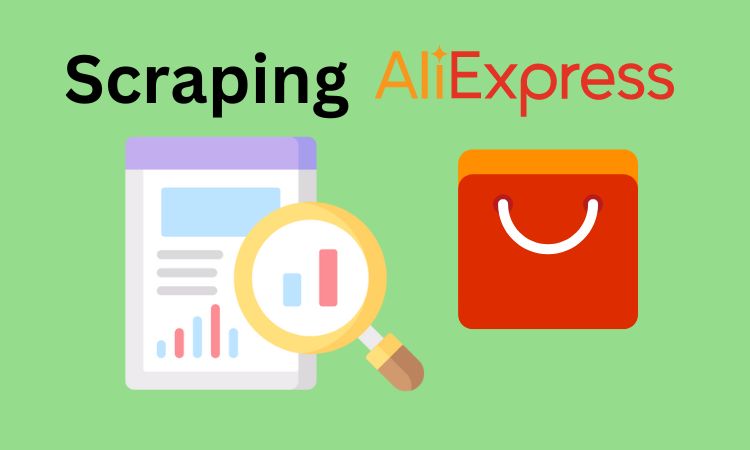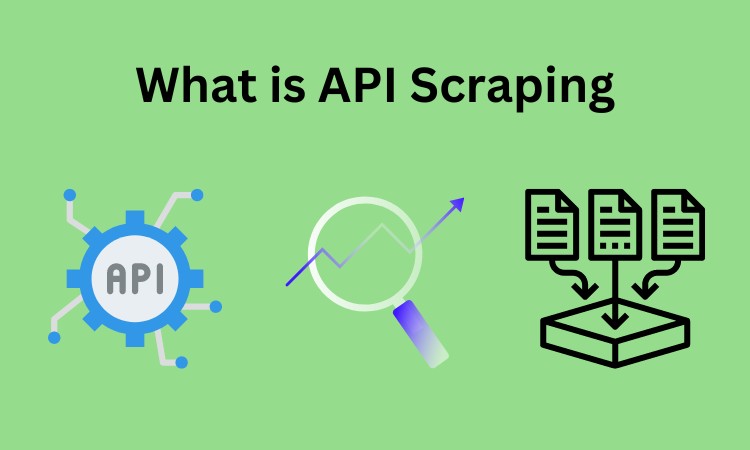What is Price Scraping? What are the Benefits of Price Scraping?
This comprehensive blog post will answer your query: what is price scraping? Its applications, benefits, potential challenges, and legal considerations.
In today’s digital age, businesses constantly seek ways to gain a competitive edge, make data-driven decisions, and optimize their pricing strategies. One technique that has emerged as a game-changer is price scraping.
This comprehensive blog post will delve into the concept of price scraping, its applications, benefits, potential challenges, and legal considerations. So, let’s dive into the world of price scraping and uncover its potential for your business.
Now let’s have the answer to your question: what is price scraping?
What is Price Scraping?
Here is the answer to your query: what is price scraping?
Price scraping, price harvesting, or price crawling is the automated process of extracting pricing information from various websites or online platforms. It involves utilizing web scraping techniques to navigate websites and collect data on product prices, descriptions, availability, and other relevant details.
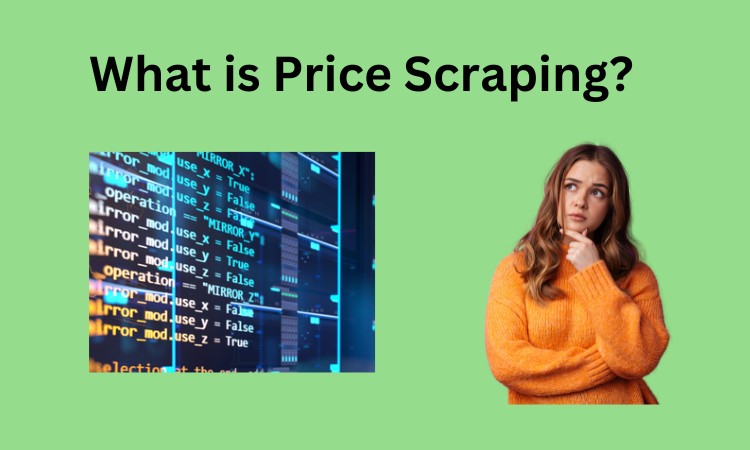
The Importance of Price Scraping
In today’s highly competitive business landscape, understanding market dynamics, monitoring competitors, and staying up-to-date with pricing trends are crucial. Price scraping plays a significant role in helping businesses gain a competitive edge and make informed decisions. Here’s why price scraping is important:
1-Real-time Competitor Monitoring: Price scraping enables businesses to monitor their competitors’ real-time pricing strategies. By tracking price changes, identifying discounts or promotions, and analyzing competitor positioning, businesses can adjust their pricing strategies to stay competitive and maximize profitability.
2-Market Research and Insights: Price scraping provides valuable data for comprehensive market research. By analyzing pricing trends, identifying demand patterns, and assessing consumer behavior, businesses can gain insights into market opportunities, identify niche segments, and develop effective marketing strategies.
3-Pricing Optimization: With price scraping, businesses can optimize their pricing strategies based on market dynamics, demand fluctuations, and competitor pricing. Businesses can maximize revenue generation, improve profit margins, and attract price-sensitive customers by identifying the optimal price points for their products or services.
4-Competitive Intelligence: Price scraping allows businesses to gather competitive intelligence by analyzing pricing data across multiple competitors. This information helps businesses understand the market landscape, identify pricing gaps, and make strategic decisions to differentiate themselves.
What are the Benefits of Price Scraping?
Price scrapping has several benefits; here you go.
1-Competitive Intelligence and Market Research
- Price scraping provides businesses with valuable competitive intelligence by monitoring competitors’ pricing strategies, discounts, and promotional offers.
- Businesses can gain insights into market trends, demand patterns, and consumer behavior, enabling them to make data-driven decisions and stay ahead of the competition.
2-Dynamic Pricing and Revenue Optimization
- Price scraping empowers businesses to implement dynamic pricing strategies based on real-time market data, demand fluctuations, and competitor pricing.
- By adjusting prices dynamically, businesses can optimize revenue generation, maximize profit margins, and respond to market changes effectively.
3-Improved Decision-making and Strategy Development
- Price scraping offers businesses accurate and up-to-date pricing data, enabling them to make informed decisions regarding product pricing, market entry, and strategic planning.
- Businesses can identify patterns, forecast future price movements, and develop effective pricing strategies by analyzing historical pricing trends.
4-Enhanced Customer Insights and Personalization
- Price scraping helps businesses gain insights into customer preferences, price sensitivity, and purchasing behavior.
- By analyzing pricing data and customer responses, businesses can tailor their offerings, create personalized pricing models, and improve customer satisfaction and loyalty.
Challenges and Considerations
1-Legal and Ethical Considerations
- Price scraping can raise legal concerns, as it may violate a website’s terms of service or infringe upon intellectual property rights.
- It is crucial to understand and comply with applicable laws, seek necessary permissions, and respect website owners’ policies to avoid legal repercussions.
2-Technical Challenges and Data Quality
- Websites often have dynamic content that changes frequently, making it challenging to ensure the accuracy and integrity of scraped data.
- Implementing mechanisms to validate and verify the scraped data is crucial to maintain data quality and make reliable business decisions.
3-Website Blocking and IP Restrictions
- Websites may employ measures to prevent or restrict web scraping activities, such as blocking IP addresses or implementing CAPTCHA challenges.
- Overcoming these obstacles requires advanced strategies, such as rotating IP addresses or utilizing proxy servers, to ensure uninterrupted price scraping operations.
4-Scalability and Performance
- Scaling price scraping operations to gather data from many websites or dealing with high-traffic websites can pose technical challenges.
- Efficient data retrieval, processing, and storage mechanisms need to be implemented to promptly handle the volume and velocity of data.
Price Scraping Best Practices
1-Respecting Website Terms of Service and Policies
- It is essential to familiarize oneself with the terms of service and policies of the websites being scraped.
- Respecting website owners’ guidelines, such as scraping frequency limits or restrictions on data usage, ensures ethical scraping practices and avoids potential legal issues.
2-Ensuring Data Privacy and Security
- Price scraping involves collecting and storing data, which necessitates implementing robust data privacy and security measures.
- Protecting sensitive customer information, adhering to data protection regulations, and using secure data storage methods are essential practices.
3-Regularly Updating and Validating Scraped Data
- Websites often change their structures, pricing formats, or data locations, requiring regular scraping scripts or software updates.
- Implementing validation mechanisms to ensure scraped data’s accuracy, completeness, and freshness is crucial for reliable analysis and decision-making.
4-Managing IP Blocking and CAPTCHA Challenges
- Overcoming IP blocking and CAPTCHA challenges requires implementing strategies such as rotating IP addresses, utilizing proxy servers, or using CAPTCHA-solving services.
- Monitoring and adapting to website changes or updates is necessary to ensure uninterrupted price scraping operations.
FAQs
What is Price Scraping?
Price scraping is the process of automatically extracting pricing information from websites or online platforms using web scraping techniques.
Is price scraping legal?
Yes, price scraping can be legal, but it is essential to comply with applicable laws, regulations, and website terms of service. Some websites explicitly prohibit scraping in their terms of service, while others may require permission or impose restrictions. Understanding and adhering to order the legal boundaries is crucial to avoid potential legal issues.
How accurate is the data obtained through price scraping?
The accuracy of scraped data depends on various factors, including the source website’s quality and consistency, the scraping process’s reliability, and the validation mechanisms in place. While efforts should be made to ensure data accuracy, validating and verifying the scraped data is important before making critical business decisions.
Can price scraping be automated?
Yes, price scraping can be automated using web scraping tools, software, or scripts. Automation enables businesses to gather pricing data at scale, process it efficiently, and gain timely insights for decision-making. However, ensuring that the automated scraping process complies with legal and ethical guidelines is essential.
How can price scraping benefit e-commerce businesses?
Price scraping offers numerous benefits to e-commerce businesses, including:
1-Competitive intelligence: Businesses can monitor competitors’ pricing strategies, discounts, and promotions.
2-Market research: Price scraping provides insights into market trends, demand patterns, and consumer behavior, enabling businesses to identify opportunities and develop effective marketing strategies.
3-Dynamic pricing: Businesses can optimize based on real-time market data, maximizing revenue and profit margins.
4-Improved decision-making: Accurate pricing data helps businesses make informed decisions regarding product pricing, market entry, and strategic planning.
What are the potential risks of price scraping?
Price scraping can face several challenges and risks, including legal implications, technical complexities, data quality issues, website blocking or IP restrictions, and scalability and performance concerns. It is important to navigate these challenges responsibly, adhere to legal and ethical guidelines, and implement best practices to mitigate risks.
What are some popular tools for price scraping?
Several popular tools and frameworks are available for price scraping, such as Beautiful Soup, Scrapy, Selenium, and Octoparse. These tools provide functionalities and libraries that facilitate the extraction and parsing of data from websites, making the price-scraping process more efficient and manageable.
Conclusion
Price scraping is a powerful technique that empowers businesses to gain a competitive edge, make informed decisions, and optimize their pricing strategies. Hopefully, you get the answer to your query: what is price scraping?
By extracting pricing data from various websites and online platforms, businesses can enhance their competitive intelligence, improve market research insights, implement dynamic pricing strategies, and gain valuable customer insights.
However, it is crucial to navigate the legal and ethical considerations, address technical challenges, and ensure data integrity to harness the full potential of price scraping. With responsible practices and adherence to best practices, businesses can leverage price scraping to unlock valuable insights and drive success in today’s dynamic digital marketplace.

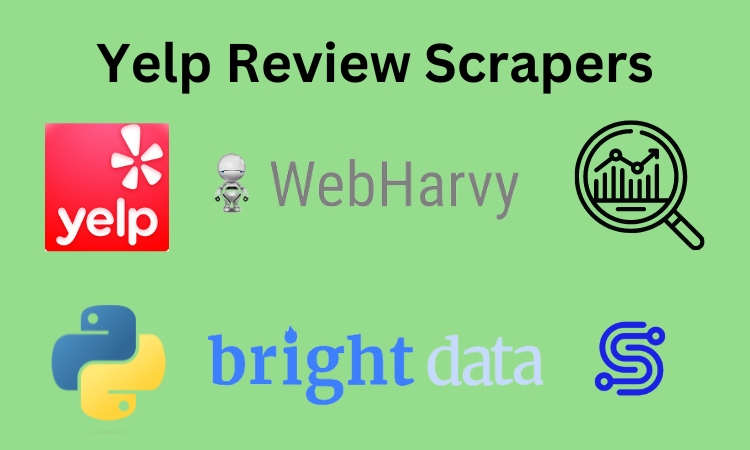

![How to Scrape Slickdeals [A Comprehensive Guide]](https://www.alnusoft.com/wp-content/uploads/2023/08/How-to-Scrape-Slickdeals-1.jpg)
